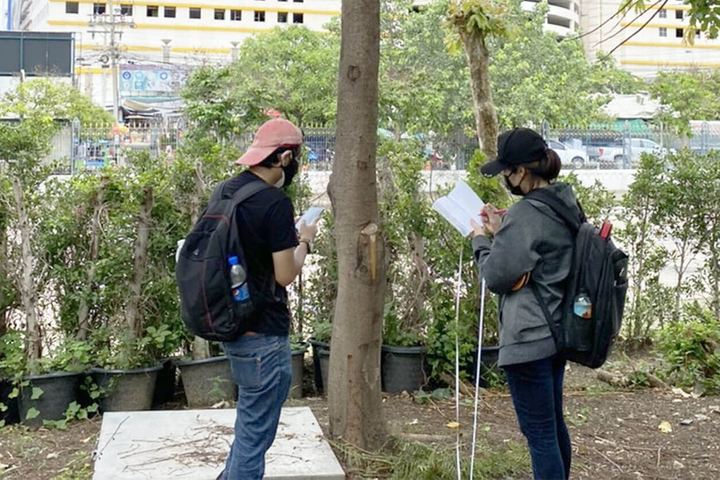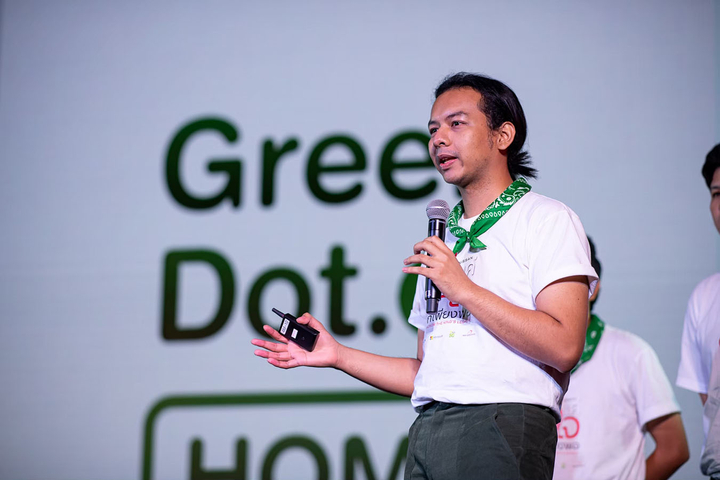As cities go greener to mitigate the effects of climate change, an indigenously-developed application helps citizens, government and the private sector to collaborate in the management of their cities’ public green spaces. Arnon Boonyapravase, the brain behind the Green Dot app, shares his journey and future plans.
After graduating in computer science and software development, specialising in mobile applications, I worked on a farmer’s entrepreneurship project to create a database of plant varieties developed. While working on that project, I realised that the database could be used for a broader group of beneficiaries.
I got the idea of using these resources since shaded areas and green public spaces benefit everyone. In cities like Bangkok, asphalt is dominating public spaces, and trees are making way for parking lots. We need to find ways to re-green our cities.
Greening our cities with trees and plants eases the impact of heatwaves, and the green areas absorb the increasing rainfall and prevent urban flooding. On top of this, the citizens become more healthy, breathing cleaner air; and also because they can use the green spaces for exercises like running and walking.
And involving the citizens in creating and maintaining the green spaces seemed a good idea. So I created Green Dot, a platform or application for citizens to participate, and contribute to the planning and management of green spaces.
Use of technology for citizen participation
To raise awareness and encourage citizens’ participation in taking care of green public spaces, my team and I developed the application (or app as we all refer to it nowadays) built on the plant varieties database.

The first idea was basically to provide information for people in the community to know the plants in their neighbourhood, and to report to the local government if the plants needed attention. For example, people can upload photos of trees and report if the trees are damaged and need maintenance.
For developing the Green Dot app, I received financial and technical support from the National Innovation Agency (NIA), Thailand. The NIA also helped with valuable feedback when we were developing the app.
Then we included additional features for spatial analysis. This helped us assess if the available public green areas were sufficient for the population in the locality, and the potential for further development of public green spaces.
Although we received financial support from NIA, in order to distribute this technology to the public, we needed to promote its selling points. To gain public acceptance, the app had to be validated.
To this end, with support from UNDP Thailand, my team and I had discussions with experts to develop the app further.
An indigenous app
Despite the pandemic we managed to collect data on plant species in public areas in Bangkok and in the nearby Nonthaburi province.
The Bangkok Metropolitan Administration and many administrations of the cities near Bangkok are very interested in developing and maintaining their public areas.

They have shown interest in adopting this type of app for the management of public spaces. Some international companies have approached the administrators with similar apps.
However, we have had positive feedback for our app since what my team and I have developed is indigenous and specific to Thailand. The feedback also finds our app more user-friendly, and our database of plant varieties more comprehensive.
One of the advantages of the Green Dot app is that today, many big cities in Thailand are more keen to develop green and smart cities. However, the maintenance and management of public green areas are problematic because of workload and cost. In that context, the municipalities have responded positively that our app helps them in cost-effective management of green public spaces.
A sustainable business model
Our discussions with the UNDP experts were on the three main areas namely green areas and biodiversity management, carbon management, and climate change to reflect the usefulness of our app, and to develop its final version.
I believe that innovation for society can be sustainable when it creates revenue. Our next plan is to make the app sustainable by creating a revenue model.
Although the app will be free for public use, I plan to develop additional elements in the app to create revenue by providing services to the private sector. For example, the app can provide information and analysis on the carbon trade.
We came up with this idea after our discussions with the experts and developing a business model for the app. This is one of the outcomes of UNDP support.
Collective action for greener cities
In the near future, my team and I want to increase public engagement by organising events such as learning activities in public green areas to gain knowledge in many disciplines such as forestry and biology.
People can enjoy the learning activities by exploring and posting photos of trees on social media platforms. I strongly believe that participating in activities will increase the awareness among people, and spur them to take care of nature. This would also help us to integrate relevant inputs into the app.
At Green Dot, we believe that trees have more benefits than just giving shade. They also store carbon dioxide. Expanding green spaces helps absorb carbon emissions.
As trees collectively store carbon, we need to take actions collectively.
Climate change is a complicated issue. It needs collective actions involving the government, the private sector and individuals to overcome the climate change problems, rather than absolute decisions by the government.
As Green Dot enables such collective action, my team and I are confident that our app will help us collaborate, to make our cities greener.





